Excavation Contractors Westminster
Best Excavation Contractor in Westminster
Receive multiple Excavation Services quotes for your project today! Compare profiles, reviews, accreditations, portfolio, etc... and choose the best offer.

Colorado Hydrovac
1423 25th Street, Greeley, 80631, USColorado Hydrovac and Environmental Services offer a wide variety of Hydro Excavating, and Construction Services. Ryan and Scott’s combined experience ensures each client receives the safest work practices, and ensures each job is done correctly and efficiently every time. Whether your job is large or small, call Tri-State Construction today for prompt, professional service. In addition to our Hydrovac excavation services, our construction division Tri-State Construction expands our offerings to better serve our clients throughout Colorado and surrounding states.
- Services
- Why Us?
- Gallery
Get Quote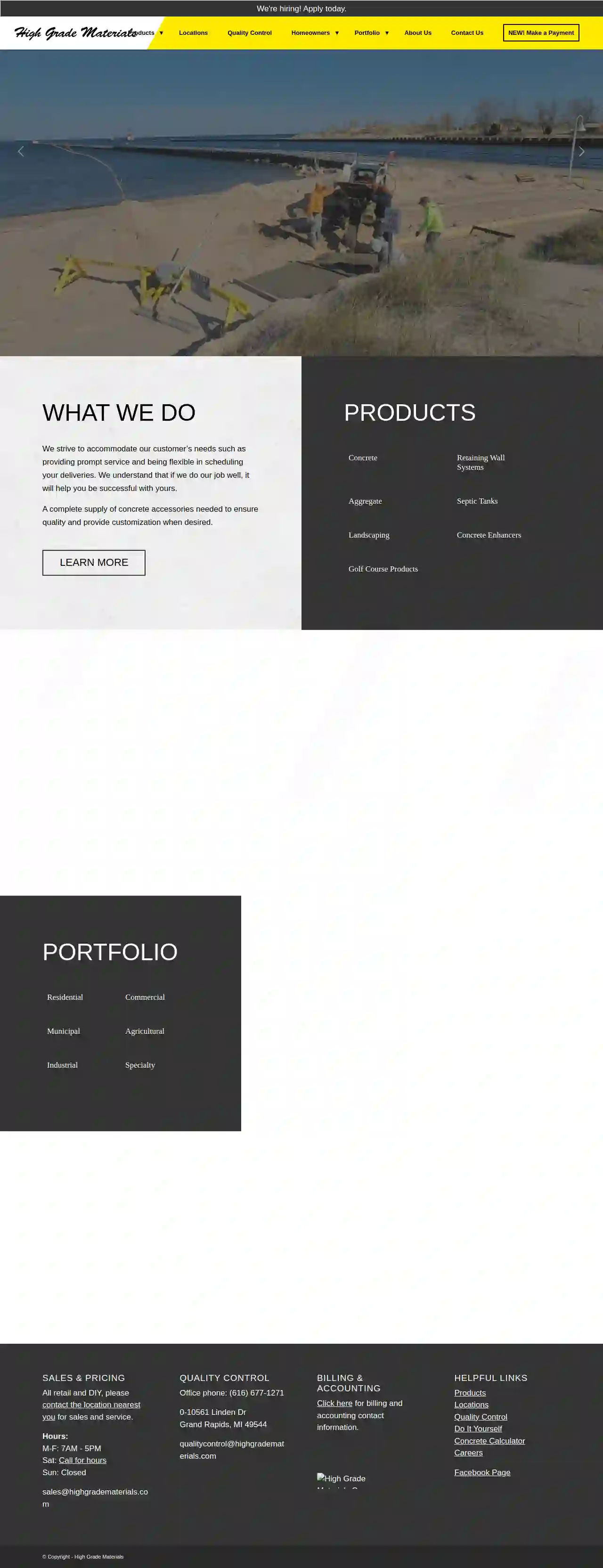
High Grade Concrete Products
410 reviews0-10561 Linden Dr, Grand Rapids, 49544, USAbout High Grade Materials High Grade Materials Company has been serving Michigan since 1975, providing high-quality ready-mix concrete, sand, gravel, and concrete products. We are committed to delivering superior service, competitive prices, and a wide range of products to meet your needs. We understand the importance of prompt service and flexibility in scheduling deliveries. Our goal is to help you succeed by providing the materials and support you need to complete your projects on time and within budget. Whether you're a homeowner, contractor, or business owner, High Grade Materials is your one-stop shop for all your concrete needs. We offer a wide variety of products and services, including: Our Services • Ready-mix concrete • Sand, gravel, and aggregate products • Landscaping products • Golf course products • Concrete retaining walls • Septic tanks • Concrete enhancers We also offer custom-designed mixes to meet your specific job specifications. Our team of experienced professionals is dedicated to providing you with the best possible service and support. Contact us today to learn more about our products and services.
- Services
- Why Us?
- Gallery
Get Quote
Earthtech
1Boulder, US- Services
- Why Us?
Get Quote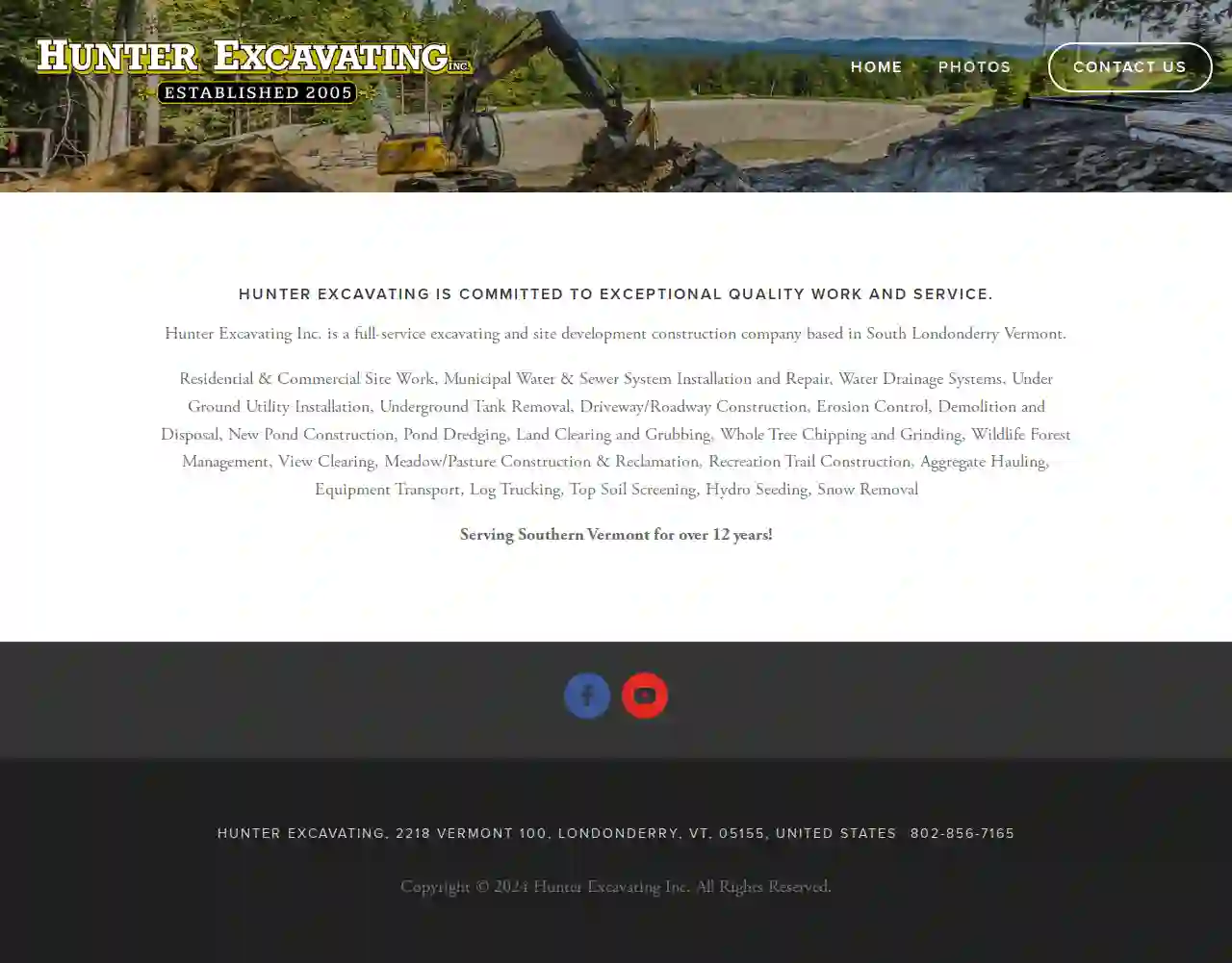
Hunter Excavating Inc.
4.611 reviews2218 Vermont 100, Londonderry, 05155, USHunter Excavating is committed to exceptional quality work and service. Hunter Excavating Inc. is a full-service excavating and site development construction company based in South Londonderry Vermont. We offer a wide range of services for both residential and commercial clients, including: Residential & Commercial Site Work Municipal Water & Sewer System Installation and Repair Water Drainage Systems Under Ground Utility Installation Underground Tank Removal Driveway/Roadway Construction Erosion Control Demolition and Disposal New Pond Construction Pond Dredging Land Clearing and Grubbing Whole Tree Chipping and Grinding Wildlife Forest Management View Clearing Meadow/Pasture Construction & Reclamation Recreation Trail Construction Aggregate Hauling Equipment Transport Log Trucking Top Soil Screening Hydro Seeding Snow Removal Serving Southern Vermont for over 12 years!
- Services
- Why Us?
- Gallery
Get Quote
chuckEX
4.79 reviewsBoulder, USAbout Us chuckEX was born out of a love of moving earth, big toys and a disdain for the ethics of many of the contractors who run them. Put simply, we enjoy what we do and we will do what we can to make it enjoyable for you as well. Our commitment is to be transparent with our customers about what we are doing and to bring to light the risks and costs involved. We strive to set expectations properly at the beginning, under-promise and over-deliver. Doing our best to expose possible surprises at the beginning of the project so that our customers have a clear picture of what the project entails. We want to take the anxiety out of excavation!
- Services
- Why Us?
- Testimonials
- Gallery
Get Quote
Dirt Tech Company LLC
4.49 reviewsParker, US- Services
- Why Us?
Get Quote
Howarth Excavating Inc
4.325 reviews9672 S Colonial Ave, Grant, 49327, USHowarth Excavating Inc. - We Dig Michigan! Howarth Excavating Inc. is a family-owned and operated business serving the lower peninsula since 1979. We specialize in a wide range of services for both residential and commercial clients, including excavating, deliveries, septic system installation and repair, land clearing, site preparation, bulk landscaping and driveway materials, driveway installation and repair, and snow plowing and removal. We are committed to providing our clients with high-quality services at competitive prices. Our team of experienced professionals is dedicated to exceeding your expectations and ensuring your complete satisfaction. Contact us today for a free quote!
- Services
- Why Us?
- Gallery
Get Quote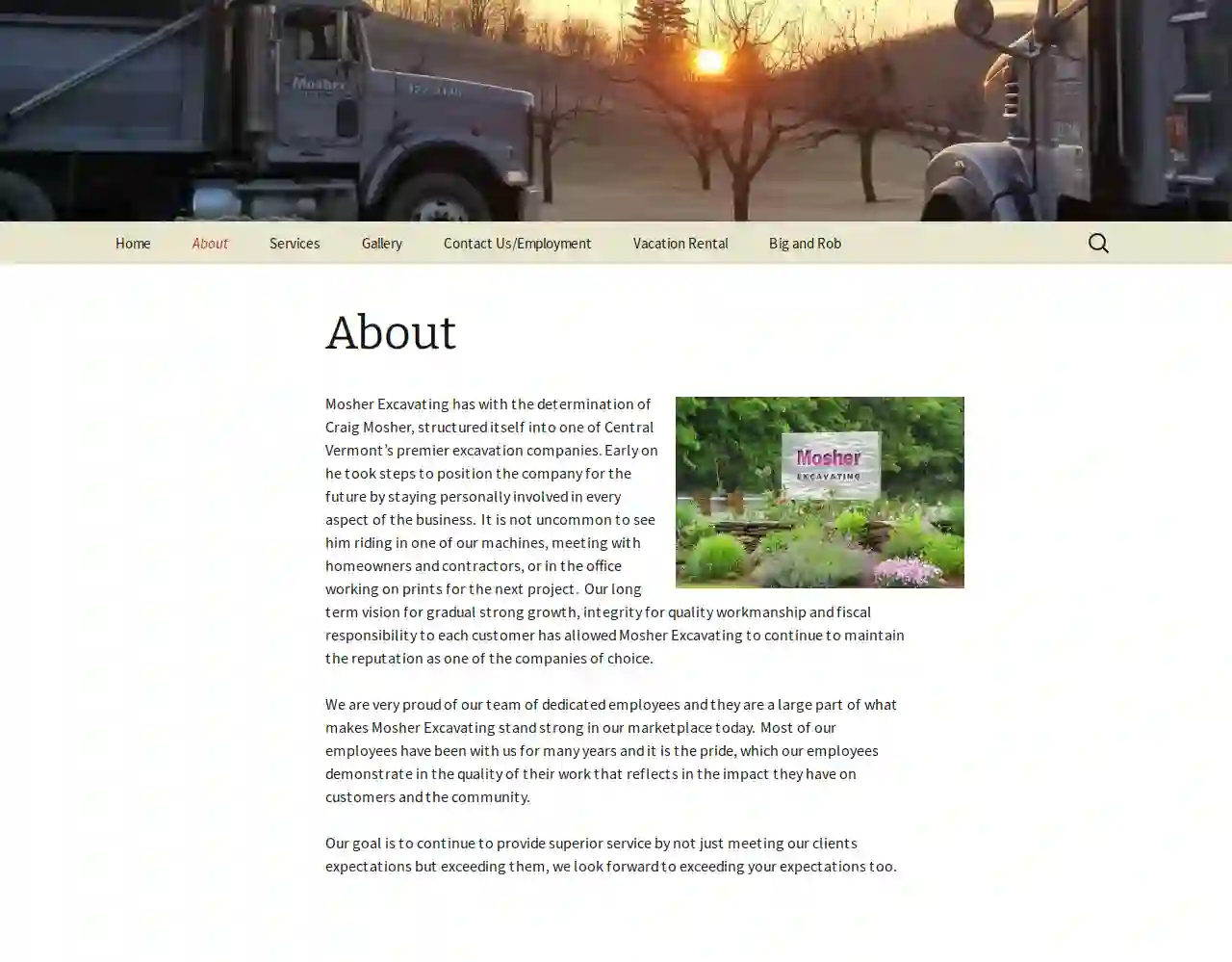
Mosher Excavating, Inc.
54 reviewsParker, USAbout Mosher Excavating Mosher Excavating, under the determined leadership of Craig Mosher, has established itself as a leading excavation company in Central Vermont. Craig's commitment to personal involvement in every aspect of the business has been instrumental in shaping the company's future. You'll often find him operating our machinery, engaging with homeowners and contractors, or meticulously reviewing blueprints for upcoming projects. Our unwavering commitment to gradual, sustainable growth, coupled with our dedication to delivering high-quality workmanship and responsible financial practices for each client, has solidified Mosher Excavating's reputation as a preferred choice. We take immense pride in our team of dedicated employees, who are the backbone of our success. Many of our employees have been with us for years, and their pride in their work is evident in the positive impact they have on our customers and the community. Our goal is to consistently provide exceptional service that not only meets but surpasses our clients' expectations. We look forward to exceeding your expectations as well.
- Services
- Why Us?
- Gallery
Get Quote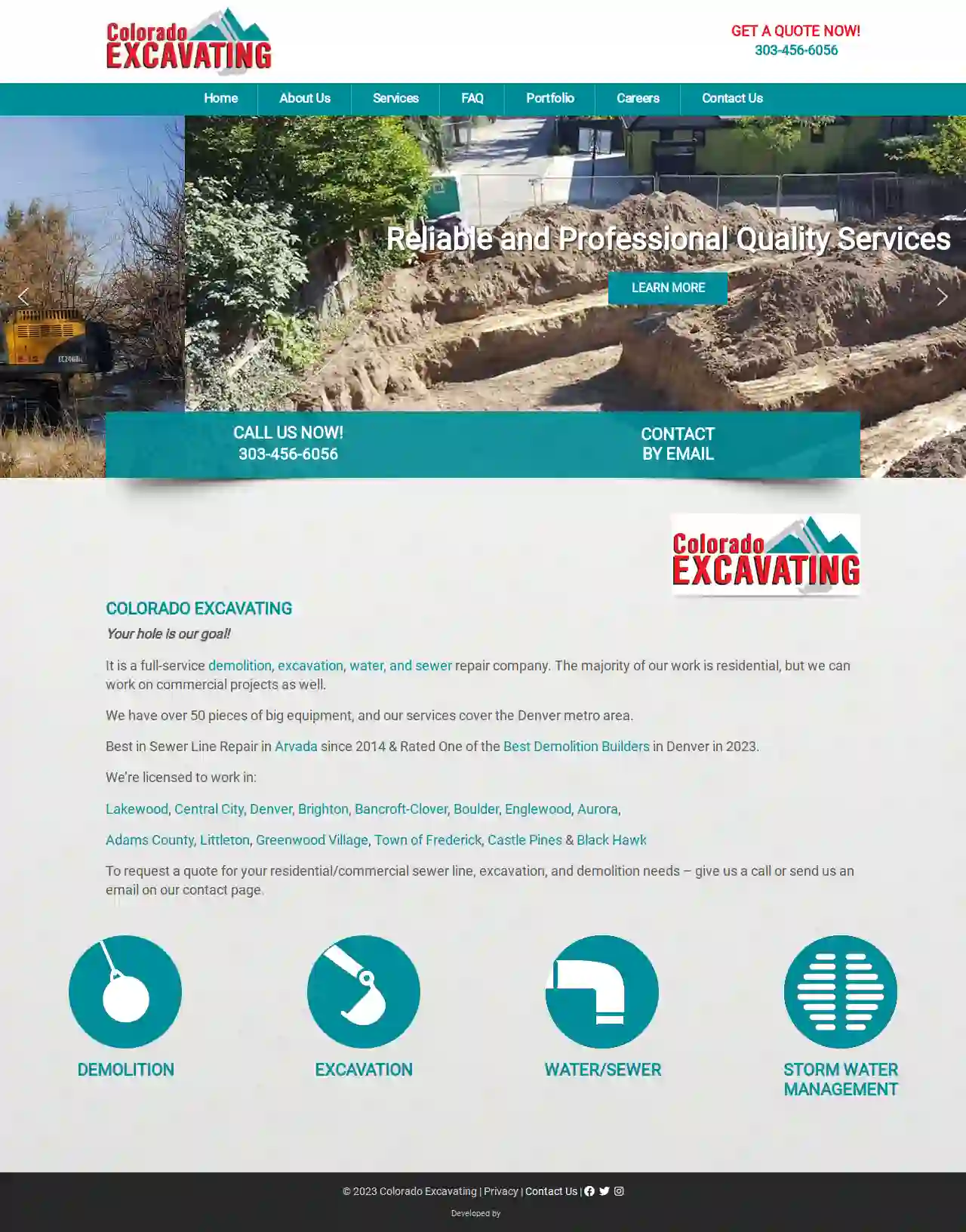
Colorado Excavating
4.332 reviewsDenver, USColorado Excavating: Your Hole is Our Goal! Colorado Excavating is a full-service demolition, excavation, water, and sewer repair company. We primarily serve residential clients, but we also handle commercial projects. With over 50 pieces of heavy equipment, we provide services throughout the Denver metro area. We've earned a reputation for excellence, being recognized as one of the best demolition builders in Denver in 2023 and the top choice for sewer line repair in Arvada since 2014. Our licensed service areas include: Lakewood Central City Denver Brighton Bancroft-Clover Boulder Englewood Aurora Adams County Littleton Greenwood Village Town of Frederick Castle Pines Black Hawk For all your residential and commercial sewer line, excavation, and demolition needs, contact us for a free quote. You can reach us by phone or email through our contact page.
- Services
- Why Us?
- Gallery
Get Quote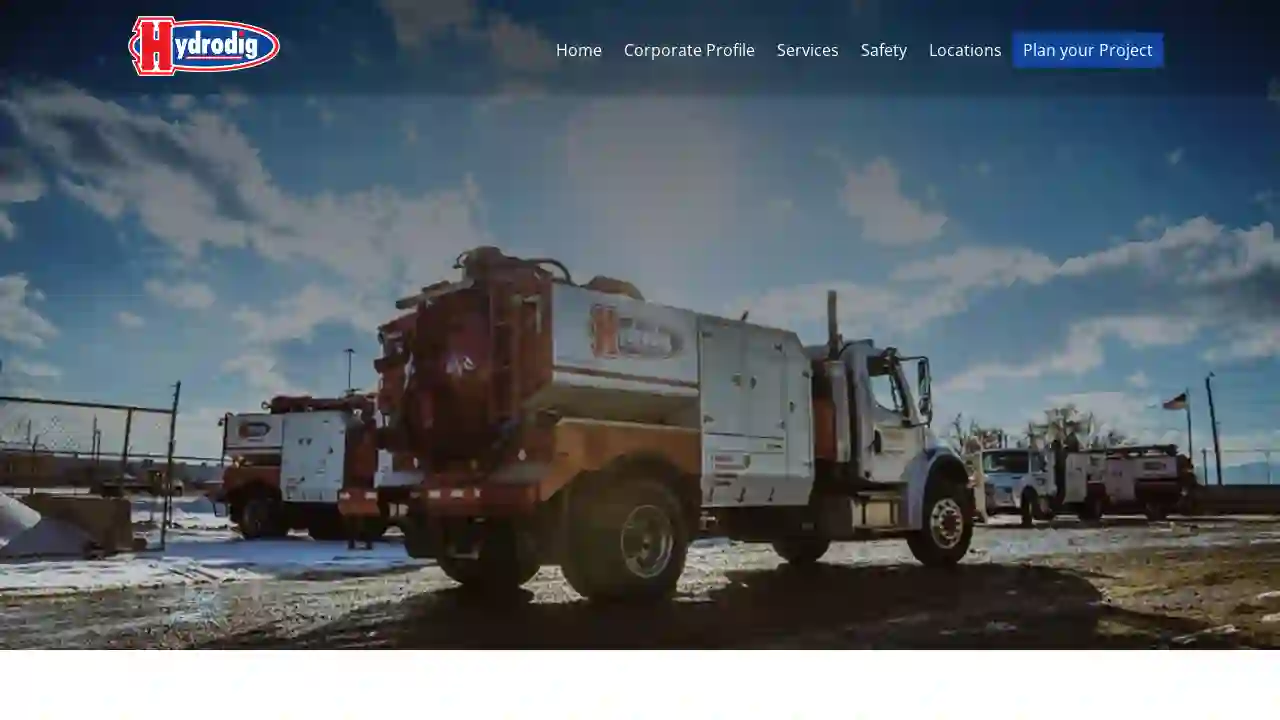
Hydrodig of Denver
4.418 reviews4410 50 St., Bentley, T0C 0J0, USWho is Hydrodig? Incorporated in 1997 and commencing hydro-excavating activities in the spring of 1998, Hydrodig™ has become one of North America’s leading hydrovac companies with Canadian service locations in British Columbia, Alberta, Saskatchewan and Ontario as well as with USA locations in Denver, CO and Dallas, TX. Hydrodig™ undertook initial Western Canada expansion in 2000 with the creation of an owner / operator network of hydrovac service providers. In 2009, Hydrodig™ created its first international entity, Hydrodig™ USA LLC. With locations from Vancouver BC to Ottawa ON and the exposure in the USA, Hydrodig™ can provide safe, efficient, and cost effective solutions to any excavation project with our unique single axle, 4×4 hydro-excavating units. What Is Hydro-Excavation? Numerous terms are associated with this activity: potholing, daylighting, hydro-trenching, hydrovacing and non-destructive excavating to name a few. What is Hydro-Excavation? Simply put, hydro-excavation is the process of utilizing high-pressure water and a powerful vacuum system to excavate. A high pressure water stream loosens the earth and other debris while simultaneously removing and storing the slurry within the onboard vacuum system. This precision orientated activity is predominately used to expose underground infrastructure while determining/proving its precise location OR its non-existence within a proposed excavation area. What is Hydro-Excavation? All in a safe, non-destructive fashion. Examples of underground infrastructure include oil and gas pipelines, water pipelines, sewer pipelines, fiber optic cables, electrical cables, and other utilities.
- Services
- Why Us?
- Gallery
Get Quote
Over 3,943+ Excavation Businesses registered
Our excavation pros operate in Westminster & beyond!
ExcavationHQ has curated and vetted the Best Excavation Companies in Westminster. Find a trustworthy contractor today.
Frequently Asked Questions About Excavation Contractors
- Clearly Define the Scope: Outline the project's goals, including the excavation area, depth, grade, and intended use.
- Obtain Necessary Permits: Research and acquire any required permits from your local authorities.
- Mark Utility Lines: Contact your utility companies to locate and mark underground utilities to prevent damage.
- Communicate with Neighbors: Inform your neighbors about the project's timeline and potential noise or disruptions.
- Prepare the Site: Clear any obstacles, such as vegetation, furniture, or structures, from the excavation area.
- Discuss Safety Protocols: Review safety procedures with the contractor to ensure a safe work environment.
- Clear the Area: Remove any obstacles, including vehicles, outdoor furniture, landscaping features, or structures, from the excavation zone and surrounding area.
- Mark Existing Features: Identify and mark underground utilities, septic tanks, sprinkler systems, or other buried elements you want to protect.
- Protect Landscaping: Use tarps or fencing to shield trees, shrubs, gardens, or other landscaping elements from damage.
- Provide Access: Ensure the excavation contractor has clear access to the work area, including gates wide enough for equipment.
- Discuss Logistics: Coordinate with the contractor regarding parking arrangements, material delivery, and any special instructions or concerns you might have.
- Excavations Deeper Than a Certain Depth: This varies by jurisdiction, usually around 5 feet.
- Excavations Near Utilities: Digging near buried utilities (gas, water, electric) often requires permits and utility locates to prevent damage.
- Excavations Affecting Public Property: Projects impacting sidewalks, roads, or other public areas typically require permits.
- Excavations in Environmentally Sensitive Areas: Projects in wetlands, floodplains, or other sensitive areas might need special permits.
What is the difference between cut and fill excavation?
Cut: Involves excavating soil from an area where the existing grade is higher than the desired grade.
Fill: Refers to using the excavated soil ('cut' material) to raise the grade in an area where the existing grade is lower than desired.
This method minimizes the need to import or export soil, reducing costs and environmental impact. It's commonly used for site preparation, road construction, and landscaping.
What should I do before excavation starts?
How do I prepare my property for excavation?
Do I need a permit for excavation?
What is the difference between cut and fill excavation?
Cut: Involves excavating soil from an area where the existing grade is higher than the desired grade.
Fill: Refers to using the excavated soil ('cut' material) to raise the grade in an area where the existing grade is lower than desired.
This method minimizes the need to import or export soil, reducing costs and environmental impact. It's commonly used for site preparation, road construction, and landscaping.
What should I do before excavation starts?
- Clearly Define the Scope: Outline the project's goals, including the excavation area, depth, grade, and intended use.
- Obtain Necessary Permits: Research and acquire any required permits from your local authorities.
- Mark Utility Lines: Contact your utility companies to locate and mark underground utilities to prevent damage.
- Communicate with Neighbors: Inform your neighbors about the project's timeline and potential noise or disruptions.
- Prepare the Site: Clear any obstacles, such as vegetation, furniture, or structures, from the excavation area.
- Discuss Safety Protocols: Review safety procedures with the contractor to ensure a safe work environment.
How do I prepare my property for excavation?
- Clear the Area: Remove any obstacles, including vehicles, outdoor furniture, landscaping features, or structures, from the excavation zone and surrounding area.
- Mark Existing Features: Identify and mark underground utilities, septic tanks, sprinkler systems, or other buried elements you want to protect.
- Protect Landscaping: Use tarps or fencing to shield trees, shrubs, gardens, or other landscaping elements from damage.
- Provide Access: Ensure the excavation contractor has clear access to the work area, including gates wide enough for equipment.
- Discuss Logistics: Coordinate with the contractor regarding parking arrangements, material delivery, and any special instructions or concerns you might have.
Do I need a permit for excavation?
- Excavations Deeper Than a Certain Depth: This varies by jurisdiction, usually around 5 feet.
- Excavations Near Utilities: Digging near buried utilities (gas, water, electric) often requires permits and utility locates to prevent damage.
- Excavations Affecting Public Property: Projects impacting sidewalks, roads, or other public areas typically require permits.
- Excavations in Environmentally Sensitive Areas: Projects in wetlands, floodplains, or other sensitive areas might need special permits.